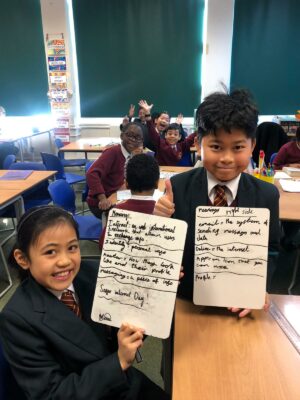 We are first and foremost a Catholic school and as such are led by the values and beliefs of the Church. Using the Come and See scheme, our curriculum celebrates our Catholic faith, encourages us to develop our relationship with God and supports us to develop as active members of our community.
We are first and foremost a Catholic school and as such are led by the values and beliefs of the Church. Using the Come and See scheme, our curriculum celebrates our Catholic faith, encourages us to develop our relationship with God and supports us to develop as active members of our community.
The National Curriculum provides a framework for the development of a child moving through the school. The children in the Nursery and Reception classes are taught using the Early Years Foundation Stage (EYFS) curriculum that sets the standards that all Early Years providers must meet to ensure that children learn and develop well and are kept healthy and safe.
It promotes teaching and learning to ensure children are ready for school and gives children the broad range of knowledge and skills that provide the right foundation for good future progress through school and life.
Every Key Stage 1 and Key Stage 2 child will be taught the National Curriculum. The basic requirements for KS1 and KS2 under the National Curriculum include “core” subjects of English, Mathematics, Science and ICT. Religious Education is also taught as a “core” subject at St. Michael’s.
In addition, the “foundation” subjects of Physical Education, Computing, History, Geography,French, Music, Art, and Design Technology are also taught. Most importantly, our curriculum that celebrates our catholic faith, encourages children to become closer in their relationship with God and work in partnership with the Parish community to prepare them for their future life. It provides opportunities for children to develop as independent, confident and successful learners, with high aspirations, who know how to make a positive contribution to their community and the wider society.
Our aim is for all children to become confident, creative and engaged learners who achieve their full God-given potential. Our curriculum has been carefully designed to:
- Engage and excite the children.
- Encourage independent learning.
- Provide a context for learning through first-hand experiences.
- Allow children to make links.
- Enable children to develop skills for the future.





